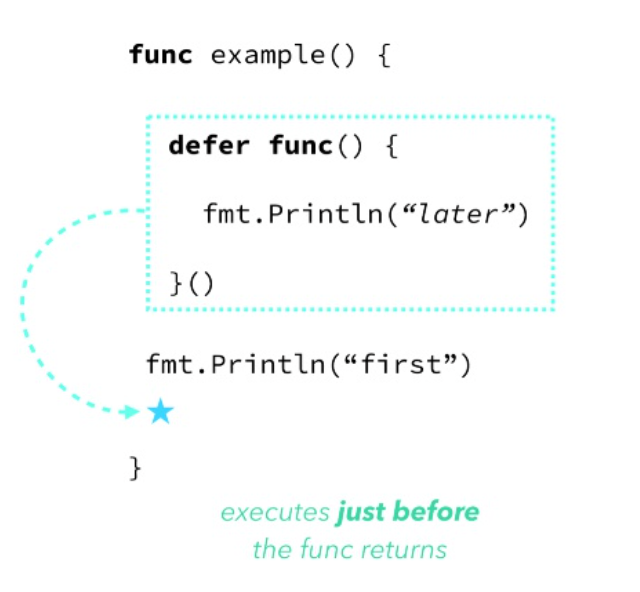延迟函数defer
我们知道在Golang中有一个关键字defer,用它来声明在函数调用前,会让函数*延迟**到外部函数退出时再执行,注意,这里的退出含义:函数return返回或者函数panic退出

defer的特性
defer函数会在外层函数执行结束后执行
package main
import "fmt"
func main() {
defer fmt.Println(2)
fmt.Println(1)
}
/* output:
1
2
*/
defer函数会在外层函数异常退出时执行
package main
import "fmt"
func main() {
defer fmt.Println(2)
panic(1)
}
/* output:
2
panic: 1
goroutine 1 [running]:
main.main()
/tmp/sandbox740231192/prog.go:7 +0x95
*/
3.如果函数中有多个defer函数,它们的执行顺序是LIFO:
package main
import "fmt"
func main() {
defer fmt.Println(2)
defer fmt.Println(3)
fmt.Println(1)
}
/*output:
1
3
2
*/
defer的用途
释放资源
比如打开文件后关闭文件:
package main
import "os"
func main() {
file, err := os.Open("1.txt")
if err != nil {
return
}
// 关闭文件
defer file.Close()
// Do something...
}
又比如数据库操作操作后取消连接
func createPost(db *gorm.DB) error {
conn := db.Conn()
defer db.Close()
err := conn.Create(&Post{Author: "Draveness"}).Error
return err
}
recover恢复
package main
import "fmt"
func main() {
defer func() {
if ok := recover(); ok != nil {
fmt.Println("recover")
}
}()
panic("error")
}
/*output:
recover
*/
总结
defer函数总会被执行,无论外层函数是正常退出还是异常panic- 如果函数中有多个
defer函数,它们的执行顺序是LIFO
在Python中的写一个defer
看到defer这么好用,Pythoneer也可以拥有吗?当然
家里(Python)的条件
Python中有一个库叫做contextlib,它有一个类叫ExitStack,来看一下官网的介绍:
A context manager that is designed to make it easy to programmatically combine other context managers and cleanup functions, especially those that are optional or otherwise driven by input data.
Since registered callbacks are invoked in the reverse order of registration, this ends up behaving as if multiple nested with statements had been used with the registered set of callbacks. This even extends to exception handling - if an inner callback suppresses or replaces an exception, then outer callbacks will be passed arguments based on that updated state.
Since registered callbacks are invoked in the reverse order of registration 这句是关键,他说注册的回调函数是以注册顺序相反的顺序被调用,这不就是defer函数的第二个特性LIFO吗?
再看下ExitStack类:
class ExitStack(ContextManager[ExitStack]):
def __init__(self) -> None: ...
def enter_context(self, cm: ContextManager[_T]) -> _T: ...
def push(self, exit: _CM_EF) -> _CM_EF: ...
def callback(self, callback: Callable[..., Any], *args: Any, **kwds: Any) -> Callable[..., Any]: ...
def pop_all(self: _U) -> _U: ...
def close(self) -> None: ...
def __enter__(self: _U) -> _U: ...
def __exit__(
self,
__exc_type: Optional[Type[BaseException]],
__exc_value: Optional[BaseException],
__traceback: Optional[TracebackType],
) -> bool: ...
可以看到它实现了是上下文管理器的协议__enter__和__exit__,所以是可以保证defer的第一个特性:defer函数总会被执行
让我们来测试一下
import contextlib
with contextlib.ExitStack() as stack:
stack.callback(lambda: print(1))
stack.callback(lambda: print(2))
print("hello world")
raise Exception()
输出:
hello world
2
1
---------------------------------------------------------------------------
Exception Traceback (most recent call last)
/defer_test.py in <module>
6
7 print("hello world")
----> 8 raise Exception()
Exception:
nice! 这行的通
行动
让我们做一下封装,让它更通用一些吧
类版本,像defer那样
import contextlib
class Defer:
def __init__(self, *callback):
"""callback is lambda function
"""
self.stack = contextlib.ExitStack()
for c in callback:
self.stack.callback(c)
def __enter__(self):
pass
def __exit__(self, exc_type, exc_val, exc_tb):
self.stack.__exit__(exc_type, exc_val, exc_tb)
if __name__ == "__main__":
with Defer(lambda: print("close file"), lambda: print("close conn")) as d:
print("hello world")
raise Exception()
输出:
hello world
close conn
close file
Traceback (most recent call last):
File "defer.py", line 38, in <module>
raise Exception()
Exception
通过配合lambda表达式,我们可以更加灵活
装饰器版本,不侵入函数的选择
import contextlib
def defer(*callbacks):
def decorator(func):
def wrapper(*args, **kwargs):
with contextlib.ExitStack() as stack:
for callback in callbacks:
stack.callback(callback)
return func(*args, **kwargs)
return wrapper
return decorator
@defer(lambda: print("logging"), lambda: print("close conn..."))
def query_exception(db):
print("query...")
raise Exception()
if __name__ == "__main__":
db = None
query_exception(db)
输出:
query...
close conn...
logging
Traceback (most recent call last):
File "defer.py", line 43, in <module>
query_exception(db)
File "defer.py", line 25, in wrapper
return func(*args, **kwargs)
File "defer.py", line 38, in query_exception
raise Exception()
Exception
Get!快学起来吧~